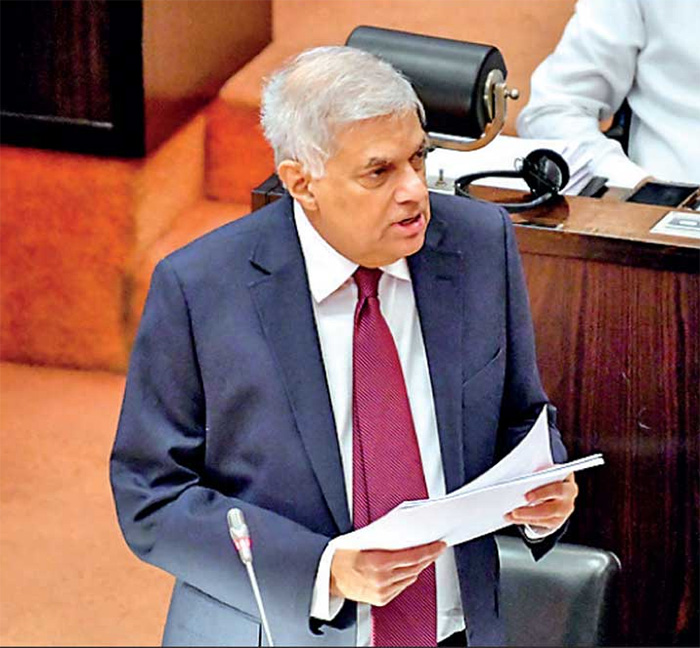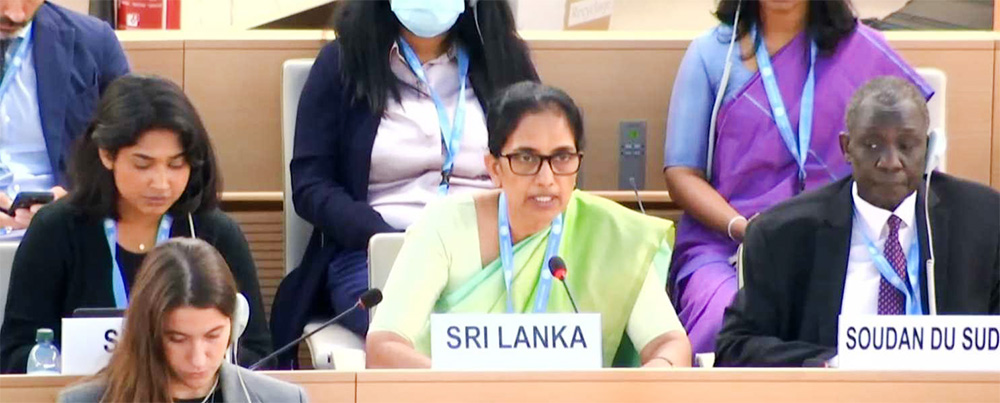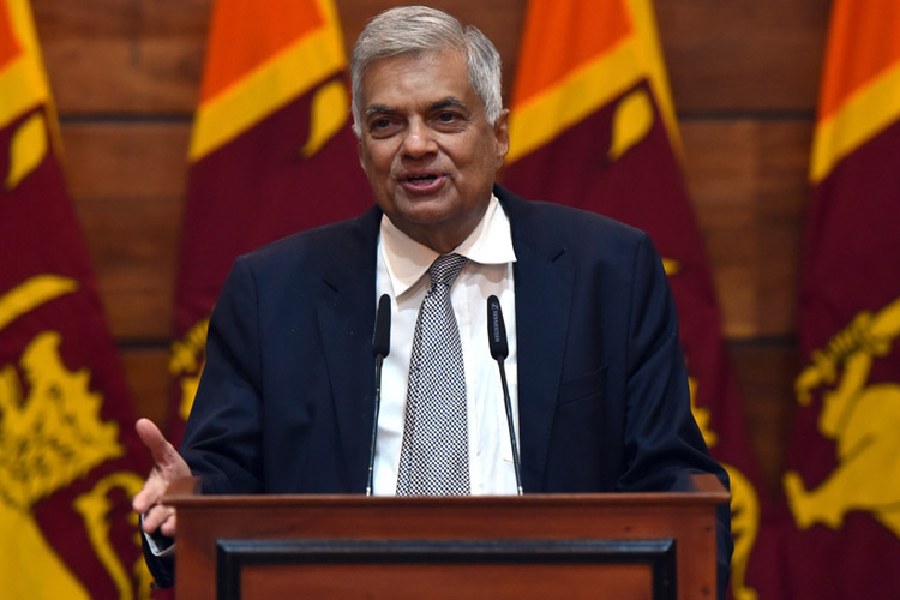By Sena Thoradeniya
(Continued from May 25, 2024)
[The previous version of Part IV of this essay and background material for the remaining parts were lost beyond retrieval due to a technical mishap. As a colleague said that it was good and recreation may make it better, the writer attempted to recreate it; but found something else reshaping.]
1. 1989 Parliamentary Elections: JVP Getting its 1st MP from Hambantota Electoral District Under a Fraudulent Method
Although the JVP entered mainstream politics contesting parliamentary elections in 1977 in four electorates, six years after its first insurrection as independents under the symbol bell (this was how bell became its registered election/party symbol later), Tangalle, Anuradhapura West, Hakmana and Horowpotana electorates respectively ; Galle and Anamaduwa by-elections held subsequent to 1977 General Elections; Tangalle, Ratgama, Akuressa, Devinuwara,Beliatta constituencies and supported one of its godfathers at Habaraduwaconstituency at the by-elections held subsequent to the Referendum of 1982, JVP was able to secure its first MP only in 1989.
After its unsuccessful bids to enter the Parliament, JVP contested 1989 General Elections in Hambantota electoral district under Sri Lanka Progressive Front (SLPF) and obtained 15,309 votes (6.2%) and secured one seat, thanks to Ranasinghe Premadasa for lowering the cut-off point to 5% to appease minority parties. Janith Priyantha Vidyatillaka Vipulaguna obtained the highest number of preferential votes under SLPF ticket, 1791 or 11.70% of the votes polled by the party or 0.73% in the district. In theory he was duly elected as an MP to represent Hambantota electoral district. But JVP did not allow him to take oaths. All ten candidates who were in the list, according to the number of preferential votes they obtained were asked to resign one after the other. JVP had a torrid time in finding one candidate who was hiding in a safe house in Wadduwa.
All were afraid about the fate hung over their heads as JVP assassinating its erstwhile comrades who did not toe the party line was lingering in their minds.
Finally, Nihal Galappaththy (later a presidential candidate and Deputy Minister of Fisheries and Aquatic Resources under CBK) who was not in the original list was nominated and was sworn in as an MP for Hambantota electoral district. Thus, a JVP MP entered the parliament for the first time under a fraudulent method, abusing the loopholes in the PR system. While all the other MPs took oaths on 25, August 1994, this nominating -resigning drama continued for several months until Nihal Galappaththy, a person who had not secured a single vote took oaths as an MP, replacing the original winner Vipulaguna.
In an interview published in The Sunday Leader” on 25, April 2004, Vipulaguna said that he spearheaded the JVP towards its first electoral victory at a time when all other JVP senior members feared to go before the public seeking a mandate. At the time of the interview, he was supporting RW and UNF.
After the second insurgency JVP members faced public wrath as murderers and were unable to visit their hometowns. There was a high level of public rejection of those associated with the JVP that many a senior felt that they should not seek public office”. Leaders felt that their lives were in great danger and refused to contest”. I had to persuade some members to agree to the inclusion of their names on the nomination papers, so great was their reluctance to dabble in democratic politics then.”
Vipulaguna served a jail term for involving in JVP politics. But there was not a single well-known person in his nomination list; many were recruited from outside the electoral district.
Some highpoints of Vipulaguna’s interview throw some light to present-day JVP/NPP leaders: JVP has no inner party democracy; members who criticize its corrupt practices and racist approach were labeled as traitors; it is completely divorced from socialist ideals; the leaders lead lives more luxurious than the lives of leaders of feudalistic parties or privileged classes; lifestyles of these leaders are appalling; some maintain their good looks at great cost to the party; some are fashion icons; they are of lower middle class origins having no ancestral wealth or business holdings; the innocent grassroot level activists must understand this; JVP is built on attractive slogans, rhetoric and emotions.
The interviewer was not smart enough to ask why did Vipulaguna resign and whether Nihal Galappaththy’s namewas included in the list.Nor did Vipulaguna reveal the reasons for his resignation and the pressure mounted on him by the JVP hierarchy.
One of Vipulaguna’s criticisms about JVP, JVP’s inability to recognize the need for a federal solution to the ethnic solution”, has being invalidated now, as Anura Kumara has pledged his support for the full implementation of the 13th Amendment, paving the way for a federal state!
2. Following JRJ’s Footsteps: Obtaining Letters of Resignation
JRJ despite the massive mandate he received in 1977, obtained resignation letters from his MPs. Insiders say that the JVP for Provincial Council and Parliamentary elections brought busloads of candidates to Colombo New Town Hall to sign nomination papers. Soon after signing, they were directed to another desk to hand over their resignation letters, pledging to resign if elected.
3. Abusing the National List
National list was introduced to bring in experts and professionals from various fields, whose knowledge, education, experience, maturity would be useful in parliamentary affairs and law making, assuming such persons does not want to entangle in electioneering, does not have the mass appeal to bring votes. But national list was abused by all political parties, by appointing either individuals who were not included in the list, coalition partners, stooges of party hierarchy, defeated candidates or moneybags who bankroll party funds.
JVP followed suit. At the 2000 parliamentary elections JVP got 10 MPs, 8 elected on district basis and 2 national list slots. For the two national list slots Anura Kumara (aka Aravinda Sahodaraya, his nom de guerre) who joined the party around 1995 and Ms. Anjan Umma were nominated respectively. Both did not fit the national list criteria. It was the first occasion that rabble-rouser Kuragamage Don Lal Kantha entered parliament from Anuradhapura electoral district securing 4304 votes (or 1.198%).
At the 2001 parliamentary elections JVP was able to increase its number of MPs to 16, 13 elected on district basis and 3 national list slots respectively. For the second time Anura Kumara secured a national list slot. Anjan Umma was bold enough to contest in Gampaha electoral district. She was elected securing 10,834 votes (or 1.089%). A JVP candidate who obtained 5957 votes (or 1.20%) winning in Mahanuwara electoral district was the strangest thing that happened in 2001. Later this person decamped and joined the UNP.
In 2004 JVP which obtained 41seats, was generous enough to give 2 national list slots to its UPFA coalition partner. JVP’s 2004 tryst with CBK will be discussed later.
At the 2010 General Elections, the first General elections held following the successful completion of the war against LTTE terrorists, the JVP true to its nature entered an unholy alliance with Sarath Fonseka-led DNA. DNA obtained 7 seats which include 2 national list slots. JVP secured 3 seats on district basis (Colombo, Gampaha and Galle respectively; later Galle JVP MP became an independent). For the third time Anura Kumara had to seek refuge in the national list. A poor show of a leader who polled 153,868 votes in Kurunegala electoral district leading the UPFA list in 2014. Thus, a party which commanded 39 seats was reduced to 4 seats within 6 years.
In 2008, 12 JVP MPs left ranks and formed NFF under Wimal Weerawansa and joined the UPFA. At the 2010 General Elections Wimal Weerawansa, who obtained 237,185 votes in 2004 topping the Colombo electoral district, topped again in the Colombo electoral district with a staggering 280,672 votes (polling more than RW of UNP, who polled 232,957 votes in Colombo electoral district), and was appointed as Minister of Construction, Engineering Services, Housing and Common Amenities under MR.
Sarath Amunugama who recently resigned as Chairman of Dilith Jayaweera’s MJP, criticizing MJP’s move to form Sarvajana Balaya” with racists” and extremists” was the Minister for International Monetary Cooperation under MR. Furthermore, Amunugama served as the Minister of Finance under CBK when 3 JVPers were in her Cabinet of Ministers. At that time, he had no qualms to sit in the same Cabinet with political assassins”.
At the 2015 General Elections, JVP secured 4 seats, one each from Colombo, Gampaha, Kalutara and Hambantota electoral districts. Anura Kumara polled 65,966 votes from Colombo electoral district, while Wimal Weerawansa secured 313,801 votes from the same electoral district contesting in UPFA ticket. Sunil Handunnetti who was elected on three occasions from Colombo electoral district polling 9438 votes at the 2001 General Elections, 152,942 votes at the 2004 General Elections and 78,126 votes at the 2010 General Elections respectively was sent to Galle electoral district in 2015 and was defeated. Thus, Anura Kumara saved himself cunningly sending a seasoned campaigner out of the district. Otherwise Anura Kumara’s re-entry to the parliament was problematical. JVP leaders know the Machiavellian and devious ways to make decisions, even to the detriment of their senior cadres. This is another learning point for those adventurers who jumped over to NPP bandwagon.
JVP’s national list slot was given to Mayadunne, a former Auditor General, an anti-corruption crusader (later exposed by social media); he took oaths as an MP and made a speech; unashamedly the JVP, immediately after he made his inaugural speech in the parliament dumped him and appointed defeated candidate Sunil Handunnetti as its national list MP. Mayadunne entered the annals of parliamentary history as the first MP who made his first and last speech in the parliament on the same occasion!
Another prominent person in the JVP national list was (Prof) Kapila Perera, who was later appointed as a Ministry Secretary by Gotabhaya. Father of Easter Sunday suicide bombers was in the JVP’s 2015 national list. Unashamedly Nalin Jayatissa, the then JVP MP for Kalutara electoral district sat in the Parliamentary Select Committee probing Easter Sunday massacre! These are the inherent features of Janus-faced JVPers.
Capitalist press who lauded Handunnetti’s role as the Chairman of COPE completely ignored the way he entered the parliament. So, if the academics, lawyers, doctors, engineers and other professionals, retired armed forces and police personnel who have flocked around NPP eyeing for national list slots should be mindful about the ignominious fate befallen on the former Auditor General Mayadunne.
At the 2020 General Elections JVP was reduced to 2 seats, but fortunate enough to get one national list slot. JVP nominated Harini Amarasuriya, a neo-liberal outsider, even though its national list contained names of old Trotskyite ideologues, old Communist” Revisionists, yahapalana constitution makers and a few NGO overlords. It is said that the foreign-funded NGO cabal, some western embassies and LQBTIQ+ lobby in Sri Lanka were behind this move. Their party stalwarts, defeated candidates including a few former ministers and deputy ministers were overlooked by the JVP. Her caste and class affiliations to landed gentry, comprador-bourgeoise and multi-national business conglomerates were compatible with the born-again JVP in nominating her. Thus JVP/NPP nominated a Colombo upper class NGO activist, a political part-timer, using its rural and subaltern votes. She was the first activist of the JVP/NPP to state that she supports full implementation of the 13th amendment. Anura Kumara followed suit. If the tail were smarter, then it would wag the dog!
4. Battle for Preferential Votes
It is common knowledge that almost all candidates of the same party fighting with each other to secure the highest number of preferential votes. Capitalist press extols JVP as the only exception in this regard. But insiders who contested elections under JVP have told us that a subtle campaign goes on promoting the candidature of leading cadres. They argue that otherwise internal migrants such as Vijitha Herath (from Welimada to Gampaha), Anura Kumara (from Tambuttegama to Kurunegala/Colombo) and Bimal Ratnayaka (from Tangalle to Kurunegala) cannot poll what they have polled in the electoral districts they represented. This was openly manifested at the 2004 parliamentary elections. The Final Report on 2004 Parliamentary Elections of the EU Election Observation Mission too sheds some light on this aspect.
5. JVP’s 2004 Tryst with CBK
How did JVP secure 39 –theoretically41- seats in the 2004 Parliament? JVP having entered into an agreement with the UPFA made an innocent” request to allow it 2 or 3 slots from an electoral district.
But against all expectations and predictions JVP was able to win in almost all electoral districts it contested. This phenomenon needs some more elaboration. SLFP was reduced to 62 seats (56 district level and 6 national list). In Colombo electoral district first 3 slots of the UPFA was bagged by JVP, Wimal Weerawansa topping the list polling 237,185 votes. First, third and fourth places in Gampaha electoral district were won by JVP displacing Anura Bandaranaike, heir-apparent of SLFP to the second place. 1st, 2nd and 6th places in Kalutara electoral district, 1st and 3rd places in Mahanuwara electoral district (an upstart of the JVP secured the first slot in the list over and above seasoned campaigners and former ministers and MPs of SLFP. D. M. Jayaratne, later Prime Minister had to be satisfied with the 5th place) were won by JVP. First place in Matale electoral district went to an unknown lady teacher of JVP (later disgraced for plagiarizing a literary work and getting a literary award for the plagiarized work). First 3 places in Galle electoral district, 2nd and 3rd places in Matara and Hambantota electoral districts, 2nd place in Digamadulla electoral district, 1st place in Trincomalee electoral district, first 3 places in Kurunegala electoral district, 2nd and 4th places in Puttalam electoral district, first two places in Anuradhapura electoral district, 2nd place in Polonnaruwa electoral district, 1st place in Badulla electoral district, 2nd and 4th places in Ratnapura electoral district and first 2 places in Kegalle electoral district were secured by the JVP over and above seasoned politicians and former MPs and ministers of SLFP.
The Final Report on 2004 Parliamentary Elections of the EU Election Observation Missionstates that, The alliance between the SLFP and the JVP was very controversial…. there are substantial ideological differences between them. In addition, the JVP is considered responsible for the assassination of the President’s husband in 1988”.
JVP made the best use of the preferential vote”.
JVP’s policy was to present only 3 candidates on the UPFA district lists”. They also managed in many districts to get these candidates appear consequently on the lists, so that it would be easy for their voters to mark JVP candidates’ numbers on their ballot papers. As a result, in almost all districts, JVP preferential votes were concentrated on their 3 candidates. On the contrary preferences expressed for the SLFP candidates were much more dispersed among them and were therefore less efficient” (our emphasis).
Another thought-provoking observations are: based on the total number of votes received by the UPFA, The Report discloses the total number of preferences SLFP candidates received and the total number of preferences JVP candidates received; shows the number of preferences useful” and effectively translated into SLFP and JVP candidates taking a seat won by the UPFA; points out preferences lost and did not allow candidates to take a seat. This accounted for the fact that39 candidates presented by the JVP being elected at district level. (Since there are several discrepancies in the statistics shown in The Final Report, we omitted those taking only the argument it makes).
The Final Report provides a table depicting JVP/SLFP translation of preferences into votes. Accordingly, total JVP non-elected votes were only 18,771 votes, which was in Badulla electoral district. SLFP’s all-island useful” votes as a percentage was 56.78%. JVP’s useful” percentage was 99% (Badulla electoral district: 84%; all other districts:100%)
It is easy to make analyses after things have happened.
If CBK or any of her campaign managers at least guessed what would happen beforehand as a result of this electoral arrangement, voting patterns would have taken a different shape. Intentions always mask what happens. What is more important? Historical events or intentions? Event goes to the history; not the intention.
6. What Are the Reasons for This Upsurge?
i. CBK’s stupidity and miscalculations allowing JVP 2 or 3 slots in the UPFA list in all Sinhala dominated electoral districts; In 1970 under the first-past-the poll system, in a 145 House of Representatives LSSP secured 17 seats and CP 6 seats respectively. This result was expected under the no-contest pact between the 3 major parties, not something came out of the blue.
But in the Proportional Representation (PR) system the mechanism is different. As a result, JVP was able to secure first 2 or 3 slots in the electoral districts they contested as explained above.
ii. SLFP candidates, candidates of the main constituent party in the UPFA, considering JVP as a friendly force advised their supporters to give one preferential vote to JVP. This was reflected by the votes polled by winning JVP candidates, SLFP stalwarts polling a lesser number of votes and some SLFP seniors completely being wiped out in the process. On the contrary JVP canvassers in a subtle way promoted their candidates only as explained earlier. Insiders who campaigned for the JVP were very much pleased with the magnanimous behavior of some SLFP stalwarts while criticizing rigid, uncompromising, sectarian attitudes of their own men and women.
iii. Since the annihilation of the Old Left with no foreseeable revival and loss of confidence of its present leaders, Old Leftists and Socialists were persuaded for voting for JVP. This was just a temporary phenomenon as JVP was unable to woo these segments in the subsequent elections, a most decisive factor leading to its downfall.
iv. Ideologues such as Dr. Gunadasa Amarasekera put forward the theory that SLFP is a headless body (decapitated body; leaderless; headless horseman”) and it needs a head (Kavandayata Hisak”). JVP was thought capable of fixing the head SLFP was searching for. Later a prominent SLFPer tried to fix X” (a group of postmodernist” middle class debaters) as its head! (X” was founded by a Muslim who lived among the Sinhalayas acquiring a Sinhala” name. This iconoclastic pretender, who propagated counter-culture muck imported from the decadent West against Sri Lankan culture, died recently and was accorded a Muslim burial. Among the chief mourners was Anura Kumara! Some academics who now provide theoretical costumes to NPP and many NPP kalakarayas and sahithyakarayas were either in the inner circles of X” or orbiting around X” and were influenced by its muck respectively).
v. Support of National organisations and anti-LTTE elements as JVP at that time was supportive of war efforts.
vi. Muragala” organ of the Jathi Hithaishi Vyaparaya” gave the required ideological guidance to the people (this writer on invitation contributed articles to this periodical on Angels of Mercy” (foreign-funded NGOs), foreign-funded films and teleplays supporting LTTE separatism, euro-centric art and literary criticism, cultural aggression etc.).
7. JVP in CBK’s Cabinet: Biting off More Than It Could Chew
JVP held four very important portfolios in CBK’s 2004 government: Agriculture, Lands, Irrigation and Livestock Development (Anura Kumara), Fisheries and Aquatic Resources (Chandrasena Wijesinghe), Rural Economy (Lal Kantha) and Culture and National Heritages (Vijitha Herath) respectively. Their deputies also were selected from the JVP.
We have reiterated many times in our previous essays that these four Ministries were like main entities of economic and socio-cultural fabric of a nation and if these ministers and their deputies were smart enough to initiate pathbreaking ventures they could have planted millions of seeds to germinate paving the way for them to capture power (democratically or otherwise). These ministries had direct influence over millions of paddy cultivators, highland and dairy farmers, fisherfolk, small scale industrialists, rural artisans and craftsmen, artists, writers, cultural activists, those who were engaged in film industry, archeology and related matters which consist most of the rural, semi-urban and urban populations. At least they were not able to increase their voter bases individually.
Of these ministers and deputies only Vijitha Herath and Handunnetti (deputy to Lal Kantha) were elected at the 2010 General Elections. Anura Kumara entered the Parliament through the national list. At the next General Elections held in 2015, Anura Kumara had to abandon Kurunegala District, one of the largest agricultural areas in Sri Lanka and find refuge in Colombo District which has the strongest middle class backing to JVP.
Of the 39 MPs elected to the Parliament in 2004 only Anura Kumara and Vijitha Herath remain in the Parliament. Others joined either NFF, FSP, UNP, SLFP or faded into oblivion. Few others remain in the JVP vowing to take our innocent voters to New Jerusalem, NPP’s Messianic Kingdom!
Although JVP’s marriage of convenience with the UPFA was short-lived, JVP failed to make any lasting imprints in the socio-economic fabric in Sri Lanka. Philip Gunawardena remained as a Minister of SWRD government for a very short period. But he is still remembered for his epoch-making legislation such as Paddy Lands Act, Multi-Purpose Cooperatives etc.
N.M., Colvin, Leslie, Anil (in 1963) and Pieter were the other Ministers in coalition governments who had done things which resonate still in the political memory of a nation. (By saying so the writer does not condone their shortcomings, weaknesses, political blunders made and Trotskyite and revisionist ideologies they upheld).
Still people scorn Anura Kumara’s ambitious tank restoration programme. That was the only other thing the JVP is remembered for other than the destruction, arson and bloodbath it brought forward.
In a recent talk show Anura Kumara was heard saying that his tank restoration programme was successful and it was ruined as there was no maintenance of the projects undertaken. This is a funny statement. Any project of this nature has its maintenance component. If he was a people-oriented leader-manager having wellbeing of peasantry in his mind he should have entrusted these tasks to farmer organisations and local level leaders reviving ancient irrigation management systems.
Insiders say that in certain villages, waterbodies having no flow of irrigation water- habitats of buffaloes- were dredged.
It was a time of plain sailing without any turbulent winds and mighty waves to wreck the vessel. Anura Kumara failed miserably. Can such a person who failed to steer the work of a single Ministry rescue a country from this economic, political and socio-cultural turmoil? On top of all US and Indian hegemonic interventions?
Anura Kumara who went to the Iranian Embassy in Colombo soon after the death of Iranian President, was seen writing his message of condolences looking at a smart phone! (A wag said it was in Persian!) Does Sri Lanka need Presidents of this caliber? Displaying photos in a London double-decker, brisk walk to the stage, putting both hands in trouser pockets and gesturing (signs of arrogance coupled with inferiority complex), ridiculing opponents using nonce words such as paw” do not make a leader.
It is out of the question discussing about how the other three ministries were managed by the other three JVPers. Neither the fisherfolk nor, the small-scale industrialists, rural artisans and craftsmen, artists, writers and cultural activists received any stimulus or square deal from them.
The writer remembers the Minister of Culture and National Heritages appointing a mediocre JVP art teacher as the Chairman of Sri Lanka Arts Council, the umbrella organization of State Literary Panel, State Drama Panel and many more panels. In 2010 this person was among the JVP national list aspirants.
8. Reasons for Leaving
Again, we rely on the information provided to us by insiders. The four ministries became millstones tied to the necks of JVP ministers. They did not know how to act efficiently and effectively even in a normal situation, let alone in contingencies.
i. They did not possess any maturity and personal attributes to manage a ministry and above all else political acumen;
ii. They did not have any knowledge of bourgeois laws and regulations even a village level Grama Seva Officer was conversant with;
iii. They were like kids groping in dark when dealing with officialdom, public administration and as a result did not command trust and confidence;
iv. They were not doers; could not translate rhetoric into action; arrogant, conceited without any practical knowledge, who parroted pseudo-proletarian and revolutionary rhetoric;
vi. Conducting political classes, addressing meetings and pasting posters are far fromacquiring management skills, enhancing them and utilizing them to achieve results in the society as a whole;
vii. They realized that holding portfolios was a severe headache and were looking for an escape route. A course correction attempted establishing a separate apparatus to streamline the affairs of the 4 ministries under an underground cadre did not bring required results, except revealing the identity of the underground cadre (later this person decamped).
JVP had not learnt anything from the Chinese, Vietnamese and Kampuchean cadres how to harmonize with legally allowed work.
Then came the escape route with CBKs bombshell Post-Tsunami Operation Management Structure (PTOMS). Even Wimal Weerawansa in his book Neththa Wenuwata Aththa” says that the JVP ministers were stressed at working within a coalition government.
9. Neththa Wenuwata Aththa”
Wimal Weerawansa after breaking away from the JVP wrote a book titled Neththa Wenuwata Aththa” (Facts of JVP Crisis) in 2008. Like Somawansa Amarasinghe he describes JVP leadership as fundamentalist, archaic, bureaucratic, sectarian, conspiratorial, dogmatist, who lacks even bourgeois ethics. In this book Weerawansa excerpts several documents submitted by JVP Central Committee/ Politburo members for intra-party discussions. But says Anura Kumara had never presented any document either to the Central Committee or Politburo; all his submissions were made orally.
Weerawansa in his book mentions about a spy who refused to contest 1994 General Elections, who was leading a carefree life in the university and joined the JVP realising that it was taking great strides. Weerawansa has not named him. Who should be credited for exposing this spy? One answer is Julie Jiyoon Chung, the outgoing US Ambassador!
NEXT: PART V










 ශ්රී ලංකා රජය ලබා ගත් විදේශ ණය මුදලක් ගෙවීම සඳහා 2023 වසරේදී ඩොලර් එකක් ලබා ගෙන ඇත්තේ රුපියල් 524.6050ක විදේශ විනිමය අනුපාතකියකට බව විගණකාධිපතිවරයා හෙළිකර ඇති බව වාර්තා වේ.
ශ්රී ලංකා රජය ලබා ගත් විදේශ ණය මුදලක් ගෙවීම සඳහා 2023 වසරේදී ඩොලර් එකක් ලබා ගෙන ඇත්තේ රුපියල් 524.6050ක විදේශ විනිමය අනුපාතකියකට බව විගණකාධිපතිවරයා හෙළිකර ඇති බව වාර්තා වේ. 
